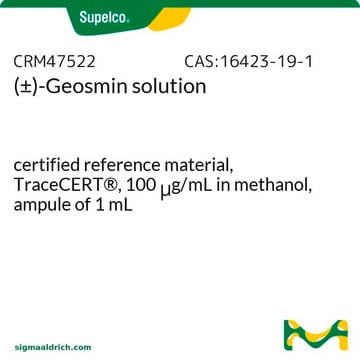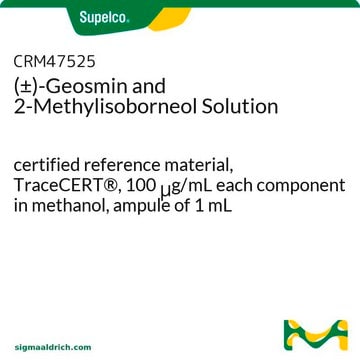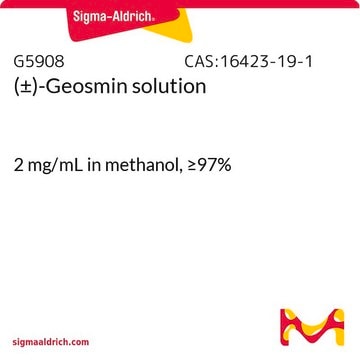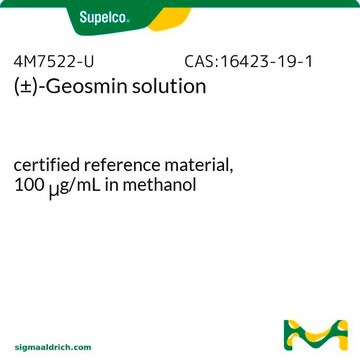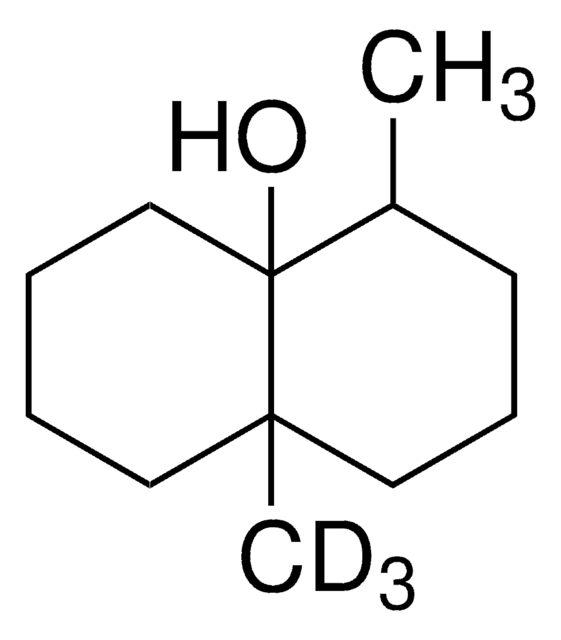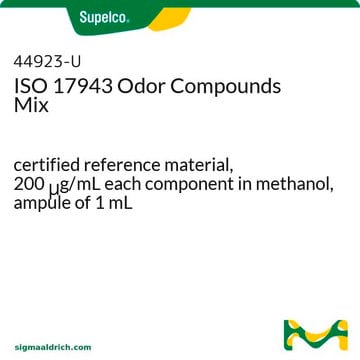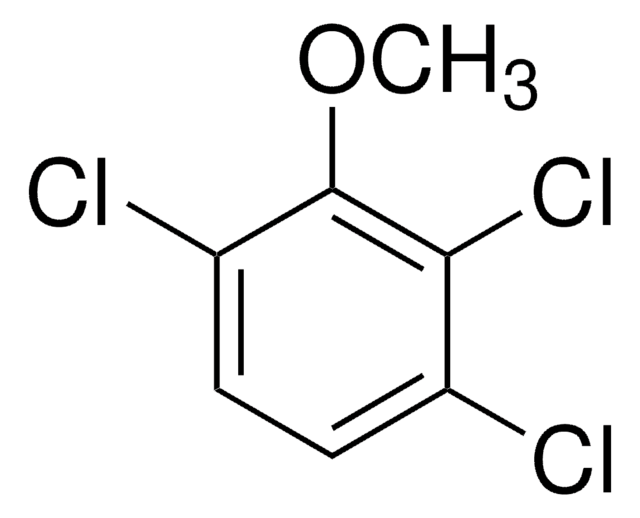UC18
(±)-Geosmin
≥97% (GC), liquid (oil)
Synonym(s):
2β,6α-Dimethylbicyclo[4.4.0]decan-1β-ol
Sign Into View Organizational & Contract Pricing
All Photos(1)
About This Item
Empirical Formula (Hill Notation):
C12H22O
CAS Number:
Molecular Weight:
182.30
MDL number:
UNSPSC Code:
12161501
PubChem Substance ID:
NACRES:
NA.77
Recommended Products
Product Name
(±)-Geosmin, ≥97% (GC)
Quality Level
Assay
≥97% (GC)
form
liquid (oil)
color
colorless
storage temp.
2-8°C
SMILES string
CC1CCCC2(C)CCCCC12O
InChI
1S/C12H22O/c1-10-6-5-8-11(2)7-3-4-9-12(10,11)13/h10,13H,3-9H2,1-2H3
InChI key
JLPUXFOGCDVKGO-UHFFFAOYSA-N
Application
(±)-Geosmin has been used as a standard for GC-MS based analytical techniques. Geosmin has also been used to study its adsorption on activated carbon.
Biochem/physiol Actions
(±)-Geosmin is produced by Streptomyces coelicolor and cyanobacteria.
Geosmin is a naturally occurring biomolecule that contributes to the earthy or musty flavor and odor in water supplies. This water contaminant can be detected by humans at ng/l (parts per trillion) concentrations.
Signal Word
Warning
Hazard Statements
Precautionary Statements
Hazard Classifications
Eye Irrit. 2
Storage Class Code
10 - Combustible liquids
WGK
WGK 3
Flash Point(F)
Not applicable
Flash Point(C)
Not applicable
Personal Protective Equipment
dust mask type N95 (US), Eyeshields, Gloves
Choose from one of the most recent versions:
Already Own This Product?
Find documentation for the products that you have recently purchased in the Document Library.
Customers Also Viewed
Flávio Henrique Jesus-Santos et al.
Frontiers in cellular and infection microbiology, 10, 408-408 (2020-09-10)
On the surface of the Leishmania promastigote, phosphoglycans (PG) such as lipophosphoglycan (LPG), proteophosphoglycan (PPG), free phosphoglycan polymers (PGs), and acid phosphatases (sAP), are dominant and contribute to the invasion and survival of Leishmania within the host cell by modulating
S W Lloyd et al.
Journal of agricultural and food chemistry, 47(1), 164-169 (1999-11-24)
The semivolatile cyclic alcohols 2-methylisoborneol (MIB) and geosmin (GSM) impart muddy or musty flavors to water and food products. A rapid quantitative analytical technique has been developed whereby microwave distillation is used to remove the volatile organic compounds from a
Bertolt Gust et al.
Proceedings of the National Academy of Sciences of the United States of America, 100(4), 1541-1546 (2003-02-04)
Streptomycetes are high G+C Gram-positive, antibiotic-producing, mycelial soil bacteria. The 8.7-Mb Streptomyces coelicolor genome was previously sequenced by using an ordered library of Supercos-1 clones. Here, we describe an efficient procedure for creating precise gene replacements in the cosmid clones
Nayra Rodrigues de Alcântara et al.
Applied microbiology and biotechnology, 104(11), 5065-5080 (2020-04-08)
Mycobacterium abscessus subsp. massiliense (Mycma) belongs to the Mycobacterium abscessus complex and is a rapidly growing non-tuberculous mycobacterium. The chronic pulmonary, skin, and soft tissue infections that it causes may be difficult to treat due to its intrinsic resistance to
Ezaz Ahmad et al.
Biochemical and biophysical research communications, 522(1), 226-232 (2019-11-25)
In Escherichia coli, G/C-rich hairpin structure followed by a U-tract in the 3' region of the nascent RNA are crucial determinants for intrinsic or factor independent transcription termination. In mycobacteria, there is a scarcity of such intrinsic terminators. However, secondary
Our team of scientists has experience in all areas of research including Life Science, Material Science, Chemical Synthesis, Chromatography, Analytical and many others.
Contact Technical Service
